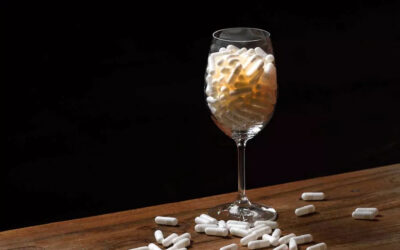Contents

Drinking alcohol while taking these antibiotics may make them less effective. The easiest way to lookup drug information, identify pills, check interactions and set up your own personal medication records. Reach out to a treatment provider for free today for immediate assistance. Get professional help from an addiction and mental health counselor from BetterHelp by phone, video, or live-chat. Dehydration, making it harder for your body to fight infections. In 2018, the Food and Drug Administration published updated safety warnings on all fluoroquinolone antibiotics.


The combination will cause effects like flushed skin, stomach cramps, nausea, and vomiting. The combination will cause effects like increased heart rate, nausea, and vomiting. Our professionals deal very kindly with you to suggest not to mix the required medicine with the alcohol by telling you the side effects. You can also take detoxification to live a life free of alcohol. You can consult our compounding pharmacy if you are taking a specific antibiotic.
While doxycycline does not have severe interactions with alcohol, pairing the two can result in changes to how well the antibiotic can treat your infection. Certain classes of antibiotics have severe interactions with alcohol. Alcohol can make an antibiotic less effective or even useless, which can interfere with your recovery.
Popular Antibiotics And Their Alcohol Interaction
Alcohol not only affects your body’s ability to heal but can also interact poorly with certain medications, leading to uncomfortable and sometimes severe side effects. Due to these factors, it is advisable to avoid drinking while taking antibiotics. Many people who drink alcohol while taking antibiotics experience stomach or digestive side effects, as well as an increased feeling of nausea. Aside from gastrointestinal issues, both alcohol and antibiotics can impair cognitive function, concentration, and coordination. We are all aware that alcoholic drinks can be harmful to one’s health.
While maintaining an antibiotic prescription, it’s common to question whether or not alcohol and antibiotics mix safely. Because of some diseases and side effects, you should not take alcohol with antibiotics. You may get a severe reaction if you mix alcohol with antibiotics. It includes the side effects such as flushing, headache, nausea and vomiting, and rapid heartbeat. At the end of the day, as with all medications, it’s important to talk openly with your own healthcare professional about the potential effects of mixing alcohol with antibiotics on you. It’s a rather unfortunate misconception that it’s safe to consume alcohol while taking an antibiotic.
We’ve all been given the advice to avoid mixing alcohol and antibiotics, though whether it’s been heeded is another story. Ciprofloxacin is prescribed to treat a number of illnesses, including skin and bone infections, infectious diarrhea, and UTIs. Fluoroquinolones like Ciprofloxacin come with warnings about rare but serious reactions including tendonitis, neuropathy, and liver toxicity. Both Sulfamethoxazole and Trimethoprim when mixed with alcohol can have nasty effects as well. These two antibiotics are used even more commonly, to treat anything from ear infections to pneumonia to a UTI. Combining alcohol with either can cause vicious headache, dizziness, extreme anxiety, chest pain, and even heart palpitations.
Most antibiotics don’t react dangerously, but drinking alcohol may lengthen and decrease the quality of the recovery period. Also, she explains that the combination of alcohol and antibiotics can cause stomach upset. Linezolid is an antibiotic used to treat bacterial infections, including pneumonia and skin infections.
- Usually, drinking alcohol won’t keep your antibiotic from working to treat your infection.
- Cephalexin may be prescribed for respiratory tract or skin infections and its side effects include gastrointestinal upset.
- Therefore, when combined, alcohol and antibiotics can create one nasty pallet of symptoms.
- When combined with alcohol there’s a moderate risk for experiencing a racing heart, nausea, low blood pressure, dizziness, and other symptoms.
Few medicines should not be taken with alcohol because they have the worse side effects. These include nitroimidazole agents, which treat bacterial infections. For some antibiotics, it can also cause dangerous interactions that may lead to serious changes in blood pressure or cause liver damage. Never drink alcohol with antibiotics unless your doctor or pharmacist has specifically told you that you can. Some antibiotics when mixed with alcohol can lead to side effects like nausea, vomiting, stomach pain, flushing, and liver damage. Alcohol can also affect how some antibiotics are metabolized in the body for elimination.
Consumer health
Join the thousands of people that have called a treatment provider for rehab information. While antibiotics can be beneficial in treating an infection, they can also cause side effects, such as an alcohol hangover. Medical News Today has strict sourcing guidelines and draws only from peer-reviewed studies, academic research institutions, and medical journals and associations.

However, there are other reasons it’s not a good idea to combine alcohol and antibiotics. While combining alcohol and antibiotics generally won’t render your medication ineffective, it can lead to uncomfortable side effects and weaken your immune system. If the label on your drug says not to drink alcohol during treatment, follow that advice. Listening to your doctor or pharmacist’s advice can help you avoid the effects of an alcohol-drug interaction. Talk to your doctor or pharmacist if you’re unsure about the details of your medications. But that likely depends on your age, overall health, and the type of drug you’re taking.
Although an occasional taking a responsible vacation while in recovery is safe with sulfonamides, healthcare professionals should exercise caution when prescribing trimethoprim-sulfamethoxazole to people who drink alcohol regularly. Antibiotics are drugs that target bacteria to treat and prevent infections. Although some antibiotics can interact with alcohol, the risks are not the same for all types. Doctors will give different recommendations about a person’s alcohol intake depending on the type of antibiotic they prescribe.
Start Healing Process with Indiana Center for Recovery
Treatment providers can connect you with programs that provide the tools to help you get and stay sober. 5 Risks When Drinking Alcohol In The Summer SunSummer is a wonderful time to go outside and enjoy outdoor activities. However, when these activities include alcohol, it can be a dangerous mix. “In general, alcohol can slow your body’s recovery process, making it take longer for you to feel better,” said Dr. Freeland. So staying away from alcohol when you’re sick is a good idea, regardless of what illness you’re facing. Have a confidential, completely free conversation with a treatment provider about your financial options.

It won’t change your medical condition, but it may help you choose the antibiotic or alcohol for your particular situation. However, alcohol and antibiotics have different side effects and, when mixed, cause danger. One of the most common interactions between alcohol and antibiotics is with metronidazole , an antimicrobial drug. Metronidazole is used to treat a range of viral infections, including stomach or intestines, as well as lungs, joints, and skin infections. A response known as a “disulfiram-like reaction” can occur when metronidazole is combined with alcohol. A few types of antibiotics,includingmetronidazole, isoniazid, trimethoprim and sulfamethoxazole, shouldn’t be used with alcohol.
We may receive advertising fees if you follow links to promoted online therapy websites.
Antibiotics can overburden and damage kidneys, which is made worse by heavy drinking. It may be tempting to drink while taking antibiotics, but this is not recommended and can be dangerous. Drinking alcohol while taking antibiotics will usually not impact their effectiveness, but combining the two substances can lead to uncomfortable side effects. Alcohol also weakens your immune system, which will not help your body fight off bacterial infection. Ask your doctor or pharmacist if your antibiotic has an interaction with any liver enzymes.
For reference purposes, common antibiotics include Amoxicillin, Doxycycline, Cephalexin and Clindamycin. Most patients with a prescription for an antibiotic will be aware of what they’re taking. However, if you’re at all unsure whether your script is an antibiotic, ask your pharmacist or doctor. If you’re still taking antibiotics, though, even if you’ve recovered from illness, it’s important to be wary of consuming alcohol.
This is usually the case with antibiotics such as metronidazole, which has a depressant effect similar to alcohol, or with any antibiotic that causes stomach pain. This can result in major accidents when it hinders coordination, and even simple nausea tends to be quite uncomfortable. To break down alcohol, the human body relies on a unique set of enzymes.
